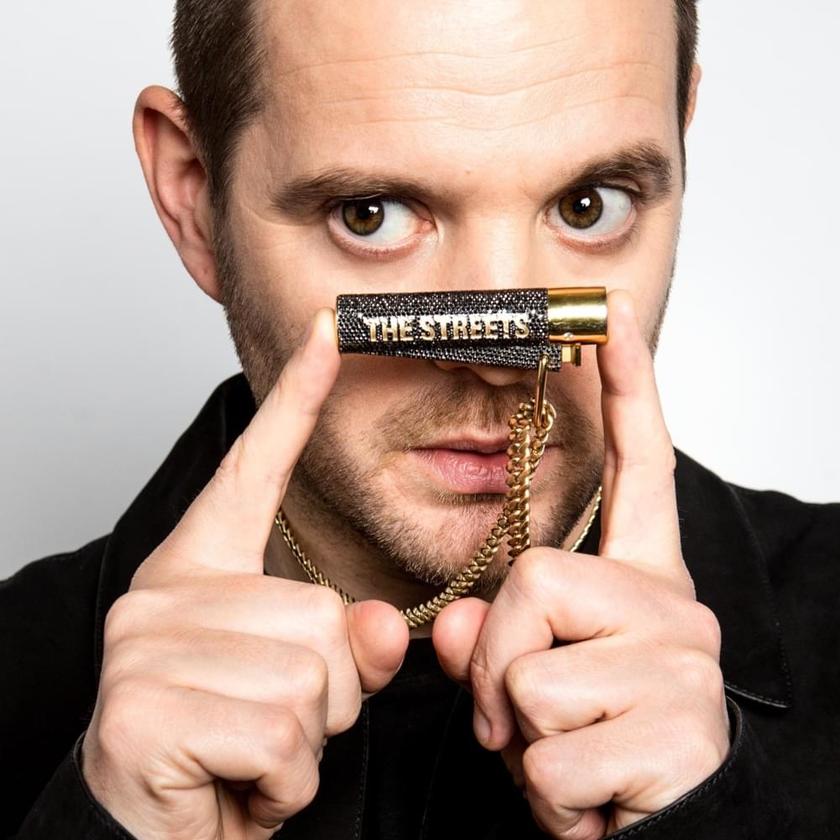Mike Skinner has performed under the name The Streets since 2001 (ish) although Wikipedia, the most reliable source of information in the world, claims he started in 1994. I'm going to go with the actual product releases, especially considering the origins of the music. If I remember correctly, he was dared to create an album with loops on a computer in his garage, and it ended up getting him a record deal. I could be wrong, but the first album, "Original Pirate Material", definitely sounds like roughly cobbled loops and was over produced vocals as if it was done in a garage in 2000/2001 (the full album was released in 2002).
I discovered The Streets because of my brother. He had purchased the 2004 album "A Grand Don't Come For Free" although the first single, "Fit But You Know It" had its music video play on PBS (of all places) as part of a documentary that I can't find. Is it a great album? No. Is it musically mind blowing and innovative? Not really. But the story in the album from beginning to end is told very very well with new details being caught every time I listen through it. Even 19 years later. My brother listened to it after his first breakup, and I similarly listened to it on repeat in my car for weeks on end when I was going through a heartbreak (I've never had a bnreakup because my wife was my first girlfriend).
The story on that album is not an epic tale, but it has lots of subtel details of a period of a man's life. I had never heard of a concept album before, so an album that was a story from front to back was mind blowing to me at 20 years old. It helped me during a heartbreak because all the details kept me distracted looking for something new in every listen, and the personal story of the character felt relatable at the time along with real expressions of emotion in the performance. But the biggest kicker is the final track that ties it all together with the message that you have to look at the big picture, pick yourself up and move forward. At 38, it's not as mind blowing because I have more life experience, but there is a lot of nostalgia for me.
The third album, "The Hardest Way to Make an Easy Living" I actually bought on release day. It's not a story, it seems to me to be more of a collection of satirical anecdotes about the music industry and fame. Almost as though he's poking fun at himself to an extent. Except for "Never Went to Church" which seems to be about grieving the loss of a father. I don't really know, because I'm not researching the history as much as talking about my history with the artist.
"Everything Is Borrowed" was the fourth album, and the title track still gets me choked up. There seems to be a lot of humor in that album too, but also some seriousness, albeit light hearted. It's another album that helped me get through a difficult time, in this case the death of my grandfather and the loss of some friends. It felt like an old friend had some new words of comfort for me. I don't know if it's ironic that God used an atheist I've never met or interacted with to help me get closer to Him, but there you are.
After the fifth album "Computers and Blues" he took a break. A long break. Six years. This album was a wide departure from the style of music before, but was still very much The Streets. He had stated before Computers and Blues that he needed to be done. If I remember correctly, he wanted the name to go because he was "tired of the connotation". I don't know what that means. But if you listen to all the albums in order, you can really see an evolution in style and quality. A roughly ten year journey documented in music. A lot of people complain when artists sound different than the previous album. The evolution of style is part of maturing. Personal growth means change, and that's going to come out in the creatons of the person growing and changing. But who they are is still who they are, and the journey from first to last is one of the coolest stories I enjoy when consuming music. It's a story the artist may not have meant to tell.
But I said in the subtitle 21 years. Skinner took a break, but I thought he had quit. Until a few months ago I found out on Spotify that he had been releasing singles again under The Streets since 2017 and even released a full album in 2020. It's a very different album than Computers and Blues musically, and actually seems to go back to the loop based roots of Original Pirate Material (album one) although with much better quality, while combining high levels of colaboration with featured artists in a similar way to Computers and Blues. It also combines the darker themes of A Grand Don't Come for Free and the humor of Hardest Way. It's like everything came together and you can almost see his entire journey spelled out in that release.
Of course, everything since 2020 has been singels and remixes, and the industry is beginning to move away from albums almost entirely. Albums as a concept, and concept albums as a result, may be a page in the history books in the not too distant future, but the journey of an artist I've been able to watch has been fascinating.
Oh yeah, it's also the only rap/hip-hop I still enjoy listening to.

















